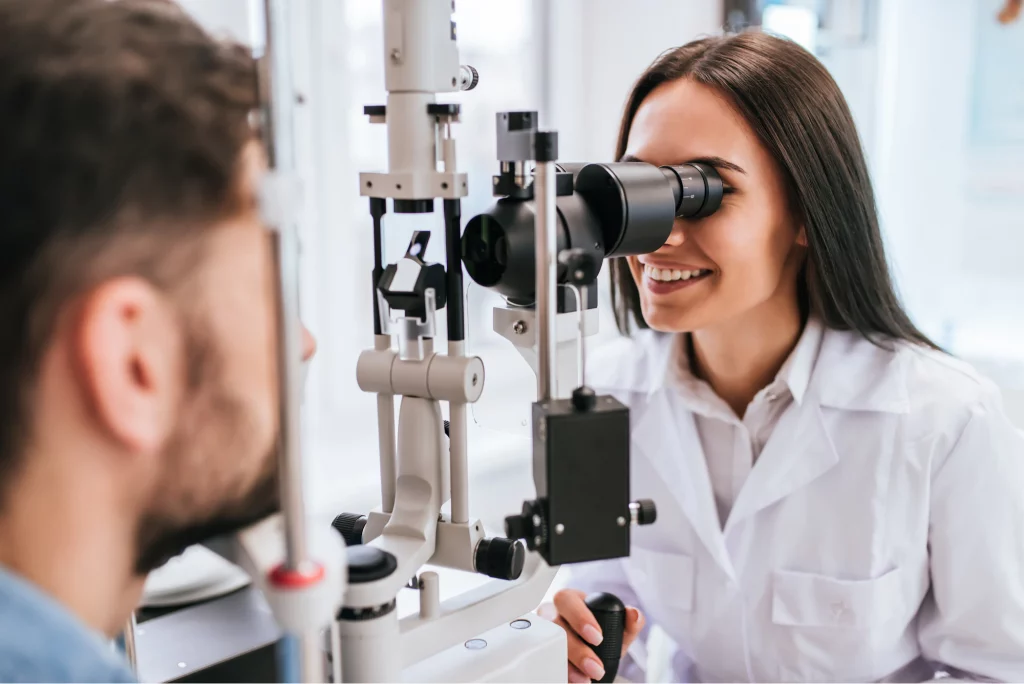Medically Reviewed by: Edward C. Wade, M.D., F.A.C.S.
Why Is a Dilated Eye Exam Important?
March is National Save Your Vision Month and while you may think that having good vision means that your eyes are healthy, that may not always be the case. A comprehensive eye exam that include dilation is important to help your doctor see the early symptoms of both vision-related and overall health problems.
When your eyes are dilated, your eye doctor can view the entire retina, including the blood vessels and optic nerve. This allows your doctor to see early signs of damage that could be indicators of serious conditions such as diabetes, tumors, high blood pressure, infectious diseases, macular degeneration and retinal detachment as well as other conditions.
If your doctor recommends dilation, he or she will put special drops in each eye to widen the pupil, which is the opening in the center of the iris (the colored part of the eye). Dilating the pupil allows more light to enter the eye the same way opening a door allows light into a dark room. Once dilated, each eye is examined using a special magnifying lens that provides a clear view of important tissues at the back of the eye, including the retina, the macula, and the optic nerve.
In a person with diabetic retinopathy (the most common diabetic eye disease and a leading cause of blindness in the United States), the exam may show swelling or leaking of blood vessels in the retina, the light-sensitive layers of tissue at the back of the eye. Your doctor may also see abnormal growth of blood vessels in the retina associated with diabetic retinopathy.
In age-related macular degeneration (AMD), a common cause of vision loss and blindness in people over the age of 50, the exam may show yellow deposits called drusen or clumps of pigment beneath the retina. In some cases, the exam may also show abnormal growth of blood vessels beneath the retina. These AMD-related changes tend to cause deterioration of a small area of the retina called the macula, which is needed for sharp, central vision.
A comprehensive dilated eye exam is also critical for detecting glaucoma, a disease that damages the optic nerve, which carries information from the eyes to the brain. In a person with glaucoma, the dilated exam may show changes in the shape and color of the optic nerve fibers. The exam may also show excessive cupping of the optic disc, the place where the optic nerve fibers exit the eye and enter the brain.
While your eyes are dilated, they will be more sensitive to light. If you do not have sunglasses with you, the doctor’s office will have disposable shades for you to use as you leave. You may also experience difficulty with close-up vision until the drops wear off, usually within a few hours.
Please remember, getting a delated eye exam can save your vision.
Related Articles
Financing Options Available
Apply today to find a financing option that meets your needs.
Our Locations
Houston/Bellaire
6565 W. Loop S., Suite 650Bellaire, TX 77401
Medical Office:
713-797-1010
Medical Fax:
713-357-7276
LASIK/Near Vision:
Office: 713-395-1515
Fax: 713-357-7278
Pasadena
4415 Crenshaw RoadPasadena, TX 77504
Medical Office:
281-977-8800
Medical Fax:
281-977-8877
Sugar Land
15200 S.W. Freeway, Suite 130Sugar Land, TX 77478
Medical Office:
281-277-1010
Medical Fax:
281-277-4504
Clear Lake
455 E. Medical Center Blvd., Suite 110Webster, TX 77598
Medical Office:
281-332-1397
Medical Fax:
281-282-9152
Katy
Greenhouse Medical Plaza2051 Greenhouse Road, Suite 110
Houston, TX 77084
Medical Office:
346-547-7070
Medical Fax:
281-214-2971
The Woodlands/Conroe
100 Medical Center Blvd., Suite 118Conroe, TX 77304
Medical Office:
936-647-1610
Medical Fax:
936-647-1620


